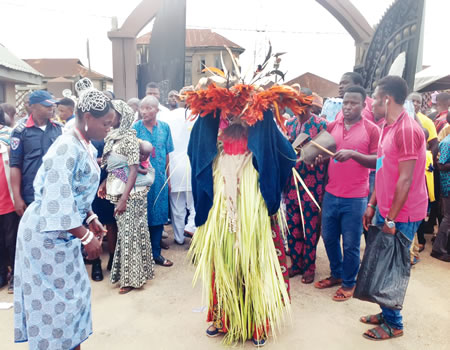Ikole is a unique town and occupies a special place in Ekiti State. It is a classic example of peaceful coexistence and community. This is one community that has several others fused in one and they reside together in close vicinity. The cosmopolitan Ikole-Ekiti has several other communities within and each has it’s own king.
For instance, when a visitor is in Ikole, such a visitor would need some education to be able to identify the distinct people that make up the metropolis. Among others, Ikole exists, for example, along with Esun, Odo Oro, Ootunja, Isaba, Temidire, Asin, Oke Ijebu, Ikoyi, Usin. They came together to form the Egbeoba Kingdom. Some of the communities in Ikole Local Government Area, which headquarters is in Ikole town, include Ijesa Isu, Oke Ayedun, Oke Ako, Irele, Ipao, Itapaji among others.
For instance, on October 1, 2011, when the current traditional ruler of Asin Ekiti, Oba Abraham Babalola ascended the throne of his forefathers, he announced that the people of Asin settled in their current location in Ikole in 1928, as one if the components of the Egbeoba Kingdom. Oba Babalola had gone into a long history of the people of Asin-Ekiti, whom he said dated back to Ile Ife.
Oba Babalola said: “Before the people were led by two descendants of Oduduwa, Peepe and Imodorin, to settle at Upole Asin, where they lived for several decades. They had sojourned at Igbo Erin, Igbo Olusin, and Igbo Ola. The people finally settled settled at the present Ikole road in 1928 in solidarity with other Ekiti towns to form the present Egbeoba Kingdom. Upole Asin remains the site of our traditional heritage. This is where our traditional rites are performed, such as the installation of a new king and Imodorin Festival.”
Such is the uniqueness of Asin. To the uninitiated Asin would be referred to as Ikole, whereas Ikole has its own unique history just like the other communities.
These independent communities in Ekiti came together to form the Egbeoba Kingdom known with Ikole-Ekiti. The paramount ruler of the kingdom is the Elekole of Ikole. The Egbeoba communities were said to have formed a coalition to stave off internecine wars that ravaged the Yoruba communities in the days of yore.
Ikole was said to have been founded by Akinsale, “one of the first 16 princes to be blessed by Oduduwa, the progenitor of Yoruba. He had migrated for Ile Ife and founded Ikole, known as Akole in the early days. He was said to have met Asolo of Isolo but had later become the ruler of Ikole where he settled. Akinsale was said to have requested from his father in Ile Ife, Odu Osetura, upon which to build his palace while Obalufon and his priests (the Iworos) in addition to the 239 other deities were sent to him to make a total of 360 deities, signifying that a festival holds each day in honour of each deity. The Odu Osetura was to enable him be a conqueror, the legend stated.
Also Read: ‘Why I’m joining Ooni to promote Yoruba culture, unity’
Recently, some of the traditional rulers in Egbeoba kingdom joined the Elekole, Oba Adewumi Ajibade Fasiku Aladesekole I, in his palace to celebrate the 2017 Ikole National Day. The celebration, apart from bringing the people of the community from all walks of life together to celebrate their king and the town. It was also an opportunity to honour some deserving members of the town and other communities.
The celebration had in attendance traditional rulers from the Egbeoba kingdom including and they joined in the historical solidarity that has marked out the kingdom. There we also various masquerades and traditional dancers, who had added colour to the event, which had attracted dignitaries from various parts of the country and beyond.
Oba Fasiku, while addressing the gathering noted that Ikole was one of the administrative headquarters in the old Ondo Province and regretted that of the headquarters, only Ikole had no tertiary institution. He therefore called for the establishment of one.
The deputy governor, in a response noted that the request was not too much for the people of Ikole and prayed that the economy of the country should improve for the realization of the numerous programmes the Fayose-led administration in the state had in store for the people. He thanked the people for their support and the chairman of the council, Mr. Adeyanju Adeyeye and the chairman of PDP in the state, Chief Gboyega Oguntuwase for their works in the state.
Some of the prominent sons of the town, including Professor Jacob Festus Ade Ajayi; Chief Bunmi Awotiku; Apostle Babalola Ola-Ojo were among the indigenes honoured while the chairman of the day, a prominent son of Iree in Osun State, Aare Oluwole Taiwo was also honoured.





